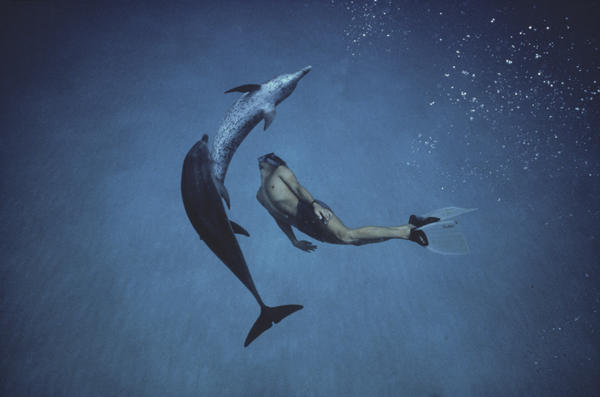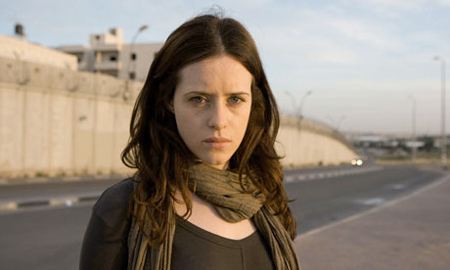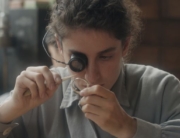
Morad in a scene from DOLPHIN BOY (Other Israel Festival)
The just-concluded Other Israel Film Festival showcased notable films by and about the 20 percent of Israeli citizens who are Arab (Christian, Muslim, Bedouin, and Druze) and other minorities, like migrant workers and immigrants. (Some of the films from previous editions, and other festival activities, are also streaming online on demand at OtherIsraelOnDemand.org.) Including U.S. and New York premieres, the best of the documentaries and fiction features did more than just showcase Israelis not usually seen by Americans:
Documentaries
Dolphin Boy, the opening night presentation, begins with Morad frolicking in the ocean with dolphins, and then it flashes back four years earlier when he was a catatonic patient unresponsive to a hospital psychiatrist. The then-17-year-old Israeli Arab suffered from severe post-traumatic stress after a beating at school back in his home village in northern Israel. The film seems headed to become another touching tribute to the irony of superior Israeli medical care amidst the region’s continuing violence, but that’s only part of the fascinating story. Morad’s father is willing to sell his flocks and his family’s land to find any cure that will avoid the institutionalization of Morad. He even camps on the beach to be near his son at the Dolphin Reef, where co-director Yonatan Nir worked as a nature photographer. There dolphins freely gathering around piers and people in a natural, open playground. (The underwater photography is beautiful.)
Co-director Dani Menkin follows Morad’s growing maturity, as he did of another unusual disabled man in 39 Pounds of Love (2005), to reveal an astounding rebirth into a new personality under the sea through long sessions of dolphin therapy (petting, feeding, swimming together)—but with a catch: Morad forgets his origins. Beyond the usual warm and cuddly newsmagazine features on animal therapy, Morad’s nightmares and insomnia bring his past to surface, supported by his new friends, anguished family, intrigued therapist, and the justice system that needs him to face down his attackers in court. One wonders if his preference for living in the breezy city of Eilat is due to modern Israeli freedoms in contrast to his traditional village, or if being filmed so much complicated his personal relationships. Regardless, the arc of Morad’s life has to be seen to be appreciated.
Other documentaries follow lives over time to keenly demonstrate how political frictions complicate lives in unpredictable ways. In 77 Steps, director Ibtisam Mara’ana traces her steps from her traditional Arab village to late-night parties on the roofs of Tel Aviv, where she falls in love with a Jewish-Canadian immigrant. But unlike so many other such Romeo and Juliet relationships in films, this couple and their families can’t stay in an ahistorical bubble when their roots show through (including her mother’s rejection of her lifestyle and his grandfather’s founding a kibbutz that displaced an Arab village). Mara’ana’s camera can be annoyingly intrusive and her strong opinions (she’s a lawyer and activist) aggressively push everyone’s buttons, but she has an honest appreciation that people are political beings as much as they are lovers and their parents’ children.
In Shout, directors Sabine Lubbe Bakker and Ester Gould follow three young men over a year as they leave their traditional Arab towns for opportunities in the big city, but their homes are in the occupied Golan Heights. They participate in a U.N.-brokered program that allows them to cross the border once a year to study in Damascus. Though the freedoms they experience may be outdated by the current climate (there’s glimpses of the regime’s tight control), their choices are unexpectedly complicated by family pressures, educational options, and romantic lures. Each responds in an unpredictable way.
A Place of Her Own reveals as much about social and religious divides within the Jewish community as much as the conflict with the Palestinians. For more than four years, Sigal Emanuel filmed the travails of Reut, a troubled runaway and homeless teenager, through drugs, three pregnancies, and fighting a rigidly Orthodox social service system that is backed up by the courts. In fact, a polygamous marriage with an older Palestinian seems to offer her an oasis in the desert (the arrangement shocks his neighbors). Much of her confusing trajectory is inexplicable as it is tragic, though it seems she craves a family structure wherever she can find it.
In Homecoming, Israel with all its problems, still looks good to three teenagers after they visit their parents’ homelands. Directors Noa Maiman and Orna Ben Dor follow Israeli-born offspring of foreign workers as they are given the chance to legally visit their extended families for the first time in the Congo, Peru, and the Philippines. While gaining a grateful appreciation for their parents’ sacrifices and struggles, their plunge into third-world poverty and the restrictions of traditional cultures reaffirms their decision to try to become even more Israeli by serving in the military in exchange for citizenship.

A scene from NAOMI (Other Israel Festival)
Fiction Features
The Haifa context of Naomi makes it more than the familiar noir story of the much older husband driven to jealousy by a beautiful young wife. Ilan (Yossi Pollak, looking very much like Emil Jannings’ similarly obsessed professor in Josef von Sternberg’s The Blue Angel) is an astrophysicist at Technion, the Israel Institute of Technology. Amidst the beautiful ocean views of this lovely diverse city, his best friend is an Arab police detective, and his wife’s lover is a Russian immigrant. First-time director Eitan Tzur, with Edna Mazya adapting her novel Love Burns, toys with film staples, most arrestingly Ilan’s crusty mother, a German Holocaust survivor who fortifies her son in such a tough, jaw-dropping fashion that Orna Porat garnered a supporting actress nomination from the Israeli Film Academy for her performance that spins stereotypes of a self-sacrificing Jewish mother into overdrive.
Unusual for the festival, David and Kamal is a family film by a Japanese writer/director, Kikuo Kawasaki. Two nine-year-old boys—an Israeli-American and an Arab—meet in the Old City of Jerusalem, first as antagonists fighting over a bag of collectable coins and finally as co-conspirators and friends. Their friendship takes a back seat to a whiz-bang chase within the stone walls—up, down, and through the ancient churches, tunnels, alleys, caverns, and secret passageways. A couple of stereotypes are unfortunate—the Arab boy is first seen being beaten by his grandfather for not bringing in enough earnings before he steals the pouch, while the Jewish boy is the grandson of a rich Hollywood producer. But in that distinctive setting, the boys’ charm surmounts the awkward plot.

Claire Foy in THE PROMISE (Other Israel Festival)
Part one of Peter Kosminsky’s British mini-series The Promise is being screened at a time when the phrase “1948 boundaries” is in the air, raising hackles all around about future peace talks. The drama looks through the eyes of two young people as to how that division came about and its consequences today. Filmed on location, a sulky teenage girl visits Israel today to follow in the footsteps of her grandfather, who, as a young soldier, was sent from liberating a concentration camp at the end of World War II to the frontline tinderbox of Britain’s failed, inconsistent colonial policy in the region. Though in this first episode there are a few international actors— Haaz Sleiman, Itay Tiran, and Hiam Abbass—newcomers Claire Foy and Christian Cooke effectively carry the very complicated, vividly filmed story. The narrow British-oriented perspective may be why there is no word yet on American distribution for the full four-part series, but this was a good opportunity to become intrigued to see more.






Leave A Comment